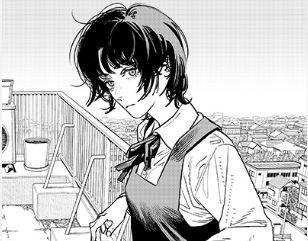Goodbye, Eri finally came out in print this past June and people who missed out on last year’s digital release got to see how great this one-shot by Tatsuki Fujimoto (of Chainsaw Man fame) is.
I myself wrote about Goodbye, Eri last year and revisited the one-shot again after getting the the print release. There’s a few panels I want to talk about here.
I will be talking about suicide after the jump.
If you’ve read the manga, you know the initial premise about the main character, Yuta, creating a film for school documenting his mother’s last days and how controversial the film ending was. Many of his classmates criticized him for being tasteless. As a result, Yuta decides to kill himself by jumping off the roof of the hospital where his mom died. It is there where he meets Eri, the female lead of our story. She then asks if Yuta’s going to jump and then says the following.

The reason I want to focus on those 4 panels now compared to last year is because of knowledge I’ve gained about talking to someone thinking of suicide over the past year. Eri doesn’t try to comfort Yuta. She probably knows he’s in a lot of pain and wanted him to unleash it on those who are disrespectful to others. Although Eri does save Yuta from jumping off the roof, it’s somewhat indirect as she comforts him in a different way than how I see most people in the West do it.
Last year, I watched a Hong Kong mahjong comedy. There was a scene where the main female lead was about to kill herself after losing everything in mahjong. As she’s about to jump off the roof of an apartment building, she hears the sound of mahjong tiles being shuffled and notices her mentor and peers playing mahjong right next to her. Her mentor asks her if she’s going to jump, the heroine says yes, and then he tells her to come down and play before going to jump off. There’s a subsequent conversation about mahjong and the mentor convinces her to keep playing/living by empathizing about her situation.
In my experiences with consuming Asian media so far, I feel like when things like suicide attempts/prevention are shown, the support system usually says you can try so-and-so before actually considering dying. Eri does this with Yuta by dragging him to watch movies with her non-stop and gain enough knowledge to make a new film for his school.
In the West, there’s no true care for the person experiencing suicidal thoughts or bad advice being given to those who interact with said individual. I can give a real-life situation. I listened to a podcast story about a woman who felt tremendous guilt over witnessing the death of a young girl she met by suicide on a expressway. She was a nurse who seemed to always have the answers for her patients at her job. But once she was in a highly tense situation outside of work, she became uncertain over what to do. She talked about what she told the girl before she died – to think about the people who love her. The girl didn’t respond well to that by saying that nobody loved her. The nurse thought about physically grabbing the girl before anything bad happened, but was worried about the response. She didn’t and the girl would walk away from her to get run over by a car. The nurse had to live with a lot of guilt and social isolation for years. When the nurse started to come to terms with the suicide and got better mentally, she said that she would’ve told the girl that life does become different and gets better over time.
So to me, it sometimes feel like the West’s mindset is “Oh my god, there’s a problem. Someone wants to die. I need to fix it or else I’ll be a failure. I can’t deal with the pain of what this person is experiencing.” while the Eastern mindset is “Ahhh, you’re thinking of dying. I see. I understand. Wait. Maybe I can show/share with you a moment of joy that you might like before you go.”
I could be VERY wrong here. But this is what I have observed over time.
Talking about death and the grief that comes with it will always be hard, but it doesn’t need to be hidden for the preservation of cultures that want to “move on” because it’s not productive for “society.”
I do think that people who experience any kind of suicidal ideation want some kind of acknowledgement of any kind – especially of the physically comforting kind from someone who doesn’t look like a threat in their eyes. Eri does this by grabbing Yuta’s hand when she drags him to the abandoned building where they would make many precious memories watching films.

After reading what Eri did and hearing the nurse’s regrets about not saving someone from suicide, just be the hope and don’t be afraid of doing so. The best way to not say goodbye in a tragic manner is acknowledge their pain with compassion followed by showing them an empowering solution (not vice versa). Suicide forces us to confront our own bias regarding emotional pain and the social aspects that lead to it. Maybe that’s why a lot of Westerners struggle with with talking about suicide.
I would argue, as this manga and maybe non-Western views show, that human love or healthy connection is the best answer.
